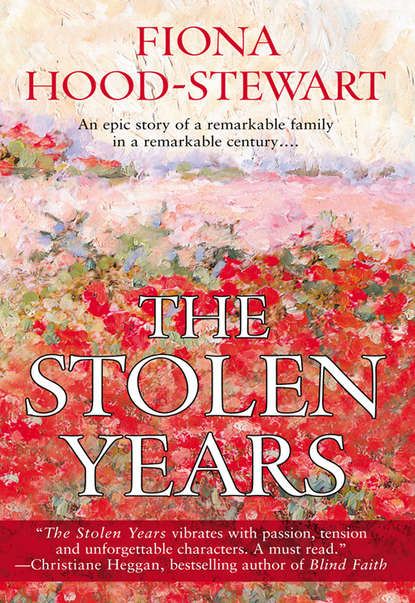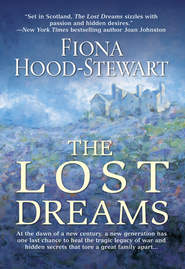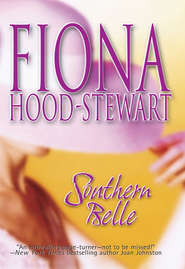По всем вопросам обращайтесь на: info@litportal.ru
(©) 2003-2025.
✖
The Stolen Years
Автор
Год написания книги
2018
Настройки чтения
Размер шрифта
Высота строк
Поля
He gazed angrily over her head at the bright autumn morning through the open window, so serene and far removed from the horrors they were experiencing. He kissed the top of her head and whispered to her as he would a child, while birds twittered and a plump gray squirrel scuttled up a branch. It was impossible to believe that, not many miles away, war was causing such endless grief and destruction. He stroked her hair tenderly, feeling her body against him, trying to keep the inevitable reactions under control. She was so brave, yet so vulnerable, and he raged at her life being so bitterly devastated almost before it had begun.
He felt her stir and eased his arms. As he looked down into her face, he became aware that these were the true casualties of this absurd war. The women, the children, the too young and the too old. He was only seventeen himself, but he felt and looked so much older. The past eighteen months of trench warfare had marked him forever. The naive boy who left Scotland now possessed more experience than most men encountered in a lifetime.
But he pulled himself together and showed none of his thoughts. Negativity was a killer. The trenches had taught him that. “Come on, Greta. I’ll clean it up later. Would it be safe to go for a short walk? I would love to go outside. You could show me around.”
She stepped back, gulped, then nodded. “I’m sorry. I shouldn’t have reacted like that.”
“Don’t be sorry. You had every reason to be upset, and I’m a damn fool for having surprised you in the first place.” He gave her a winning smile. “Let’s put it behind us and get outside. It’s a beautiful day, and I haven’t seen real fresh air for nearly two years.”
“All right.” She gave him a shy, tremulous smile, then slipped off her red-and-white flowered apron before heading through the kitchen door.
Gavin stood back and looked at the exterior of the hunting pavilion, a heavy structure built of stone and dark wood that was almost medieval in style, its gothic windows and thick walls reminiscent of a fortress. They walked through the overgrown gardens that stopped abruptly at the edge of the forest, trampling over weeds, daisies and grass that stood knee-high, and headed toward two stone benches shrouded by damp moss and clinging ivy. Beside them was a chipped Italian fountain with a dry spout that housed a family of toads.
“I’ve never seen toads in a forest before,” Gavin remarked, picking up a stone to throw at them.
“Don’t.” Greta stopped his hand. “That’s their home. They’re happy there. You have no right to hurt them.”
“That’s true,” he conceded, realizing how indifferent the war had made him. “Come on. Let’s run to the woods.”
“Run? You can’t run,” she exclaimed, her laugh girlish.
“Of course I can. It’s just a silly leg wound. I’m fine.”
“Really?” She arched an eyebrow. “Let’s see.”
With that, she set off, her long, full skirt billowing and hair flying like a young palomino’s as she set off toward the trees. Gavin followed her but knew he couldn’t make it. Damn. Would it never get better, he wondered, then laughed as Greta looked back triumphantly. He threw up his arms in a gesture of defeat and limped to where she’d stopped, flushed and breathless, conscious again of stirrings in his body that were becoming difficult to deny.
“There. You see? You’re not well yet. You have to take it easy, and I have to make sure that you do. Why, you shouldn’t even be walking around like this!”
“Right again,” he agreed, throwing himself down in the soft bed of grass and closing his eyes. “Ah, this is wonderful. Sun, blue sky and no guns, no rats, no damp, no death. Just the scent of life.” He inhaled deeply, aware of her next to him, her knees clasped up to her chin thoughtfully.
“It’s magical here, isn’t it? What happened to Franz, Mama and Papa seems unreal,” she whispered.
“Don’t.” He leaned on his elbow and took her hand. “I know this will sound cruel, Greta, but you have to stop thinking about it.”
“What a stupid thing to say,” she cried, snatching her hand away. “How can I think of anything else? I loved them. They’re my family.”
“I know. But you have to survive.”
“What for? There’s nothing left. They’re all gone. Dead. Murdered.” She pulled a wildflower raggedly from its roots. “What point is there to a life without those I loved?”
“Do you think that is what they would want?” Gavin retorted. “Is that what Franz died for? For you to sit here, blubbering and feeling sorry for yourself?”
“How dare you? What do you know about it? You haven’t lost your family. Perhaps, if it wasn’t for you, Franz might be alive.”
“Perhaps. But I did what I had to do. An officer’s first duty when taken prisoner is to try and escape from the enemy. Franz chose to join me. I never asked him to.” He rolled over again and watched her. He’d seen this state of mind. He knew how it could end up. “You can’t give up, Greta,” he said in a softer tone. “I won’t let you. I promise I’ll help you get through this, as best we can.”
“You?” She looked down at him disdainfully, pulling the petals from the wilted bud. “You’ll be off once you’re well. Don’t you want to go back to the war?” she challenged.
“Of course. At some point I’ll have to get back, but I can’t go like this.” He tapped his leg. “And I won’t leave you on your own. I owe that to Franz. We both do.” He reached up and took her fingers in his. She hesitated, then allowed him to turn her hand about.
“Do you play the piano?”
“Yes.” She sniffed. “How did you know?”
“Your hands remind me of someone I know who plays the piano, that’s all,” he said wistfully, remembering Flora playing at Strathaird, or on summer evenings in Limoges. It all seemed so long ago and so painfully nostalgic. “Will you play for me?”
She looked away. “Perhaps. Let’s go back. You must be tired and I need to milk the cow.” She pulled her hand away and got up, rubbing the grass from the back of her skirt.
“Cow?” Gavin exclaimed, following suit. “Where on earth did you find a cow?”
“It was standing in front of the house the morning after we arrived. I was frightened someone might reclaim it and find us, but they haven’t, so I’ve adopted her. I’ve called her Gretchen.”
“Then Gretchen it is. I’ll help you milk her. Maybe we can make butter.”
“Do you know how?” Greta looked at him doubtfully.
“Well, not exactly.” He grinned. “But I’ve seen Moira, our cook in Skye, do it dozens of times. Shouldn’t be too difficult,” he added nonchalantly, not about to be defeated. “Come on,” he stretched out his hand, determined to keep the smile on her face, “the only way we’ll know is if we try.”
“You’re being silly,” she demurred, then took his outstretched hand. Suddenly the destruction of the war seemed far away and the warm summer morning was well on its way as they walked slowly back toward the Schloss, both conscious of the new intimacy that reigned between them.
The days passed and they established a comfortable camaraderie. Summer ebbed gently into autumn and the leaves turned from green to red and gold, a beautiful mosaic among the dark pines. As Gavin’s leg improved, they took longer walks, although they never went too far, in case they should be seen by a chance wanderer.
After some unsuccessful experiments, they finally succeeded in making butter, and Gavin was amazed when Greta took him down into the huge, dark cellars of the pavilion, where Baron von Ritter had stocked enough food for an army. There were sausages and hams hanging on large iron hooks from the heavy oak beams; huge, airtight canisters filled with coarse brown flour, sugar, condiments and coffee; heavy stone jars of pickled gherkins and onions; and shelves filled with whole cheeses. But that was not all. Greta showed him a passage that she said went under the forest.
The wine cellar had also been magnificently stocked, probably before the kaiser’s visit, if the dates of the bottles were anything to judge by. Gavin, having spent part of every summer since early childhood at his uncle and aunt’s in Limoges, with occasional trips to nearby Bordeaux, knew good wine.
October came and the nights grew cold. The leaves turned from red and gold to bronze, and each evening they lit the huge fireplace in the study, the smallest room in the house and the easiest to heat. It was here and in the kitchen that Greta and he spent most of their time, talking about their lives, about Skye and Edinburgh, the MacLeod coal business, the summers in France where Gavin had learned how porcelain was made.
Greta listened, enthralled, for Gavin was a good storyteller, adding creative license when he felt it was required, in an effort to make her laugh and forget some of her sadness. Sometimes she would play the piano—which was surprisingly well tuned, for having spent so long silent—and Gavin thought of Flora.
Then one day he woke up and the forest had transformed into a magical, snow-covered fairyland that glistened in the morning sunlight. It made him realize just how long he’d been there and, as at the hospital, he was overwhelmed with guilt for allowing himself to fall into the comfortable rhythm with Greta, and making no attempt to get back to the front. Looking out the window, he realized that wouldn’t be possible now until spring. His leg still hurt and the limp remained, and in the back of his mind he wondered if it would ever heal. But he shunned that idea, convinced, with the invincibility of youth, that everything resolved itself at some point.
He got up and went to the window, feeling the cold, dry air mix with warm sun on his skin. Below, a trail of tiny hoofprints in the virgin snow told him deer were about. All at once he thought of Flora, ashamed that, of late, her image was somewhat hazy. He loved her, of course, but his desire and fondness for Greta was intensifying, particularly since two nights ago, when he’d heard her weeping in her room. He’d entered and sat next to her in the dark, stroking her hair. Then—he wasn’t quite sure how—she was in his arms, and their lips had met, hers closed until gently pried open, her surprise and innocent response forcing him to draw back. But he’d stayed, holding her in his arms, and there had been little sleep for him that night.
He dressed, knowing Greta would be waiting in the kitchen for them to have breakfast. They’d become like a couple, spending their days and much of their nights together. Gavin wondered with a shudder just how long he could stand the longing he felt when she laid her head against his chest, her eyes filled with love and hope. He had to keep strict tabs on himself, sure that she was unaware—as were most young girls—of the inevitable consequences of her actions. He loved her too, in his own way, but most of all he wanted her, and being so close day and night was becoming torture.
Later that day it snowed again and they sat in the study, Gavin trying to concentrate on his book, a treatise on the Franco-Prussian War, while Greta worked on a half-finished tapestry she’d found in an upstairs cupboard, oblivious of what her presence was doing to his frayed nerves. He snapped the book shut. “Damn the snow. We can’t even get out for a walk.”
“I like it. It’s so cozy being inside, watching it fall. Especially with you,” she murmured, blushing.
“I wish you’d stop that.” He got up and poked the fire. “I’ll be off as soon as the weather permits. My leg will be better by then. There’s nothing to stop me from trying to get back to my unit. I’ve stayed far too long as it is.”
“But I thought you were happy here,” she whispered, the tapestry abandoned, eyes brimming with hurt surprise.
“How can I be happy, Greta, when I should be doing my duty for my country, not lounging here doing nothing.” He poked the fire harder and a log fell sideways, sending sparks up the chimney. “I can’t spend the rest of my life rotting here. You know that.”
“Have I done something wrong?” she asked, troubled.











